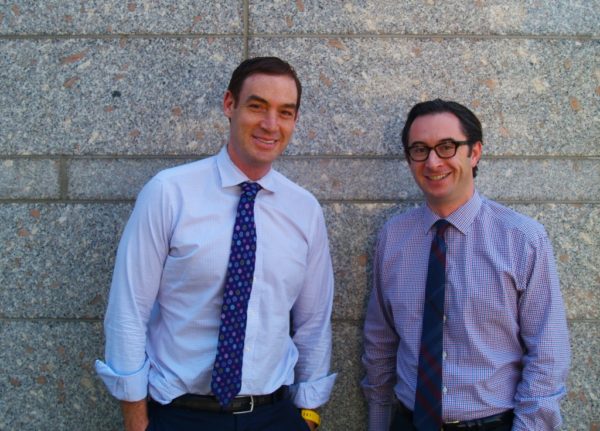Justin Borus wants to invest in the world’s next billion-dollar startup, which he believes is located 7,000 miles away in Israel.
Denver-based Ibex Investors, which Borus founded in 2003, earlier this week announced the close of its second Israel fund, with $100 million in capital commitment.
The first one, which he launched with his partner Brian Abrams in 2012, was a hybrid fund, investing in a mix of publicly traded Israeli companies and private companies. The public companies trade on the Tel Aviv stock exchange, the Nasdaq and other international exchanges.
The new fund, meanwhile, is a venture capital fund, meaning it will focus exclusively on early-stage private companies.
“Israel has had more than a dozen billion-dollar startup acquisitions in the last six years from Mobileye to Wix and Waze, and a lot of people don’t know they’re Israeli companies,” Borus said. “Unfortunately, we haven’t had one of those yet, but that’s really the goal of this early-stage VC fund is to try to tap into the next generation of notable startups.”
Ibex Investors expects the new fund to invest in Israel’s abundance of cybersecurity startups, enterprise software and transformative industries, such as drone and agricultural technology.
Borus said the firm will make 15 initial investments of between approximately $2 million and $4 million, reserving the rest of the fund to help a select few companies with a major strategic investment or an exit.
The investment firm has three employees in New York, 15 Denver employees that moved into its new 13,000-square-foot Cherry Creek headquarters in March, and — critically — two full-time employees in an office in Tel Aviv that opened last year.
“If we didn’t have a team in Israel right now, we’d be in rough shape,” Borus said. “It’s hard to make a multi-million dollar investment over a Zoom call.”
Borus said the Tel Aviv office has given Ibex an edge.
“The pandemic has created some great opportunities for us to invest in Israel,” Borus said. “Foreign investors can’t physically get to Israel right now. So there are more than 6,000 startups in Israel, most of which need capital, and the country has essentially closed. The few investors that are in Israel are solely focused on their existing portfolios, which leaves us an incredible ecosystem to work with.”
“We didn’t anticipate the country to close down, but traveling back and forth to meet with a couple hundred companies a year was hard to sustain,” he added. “Our team in Israel can meet with 10 times that, and there’s no replacement for being able to pop into a portfolio’s company and have a strategy session.”
“It’s pure luck, similar to having a VC fund in 2008-2009 after the global financial crisis, when we saw some of the best performing funds in a generation,” Borus said. “We’re hoping that will create the same opportunity for those types of returns in the coming years.”
Ibex Investors has approximately $670 million in assets under management, including its original Israel fund. Ibex has made 23 early and growth stage investments and assisted in eight startup exit strategies. Current investments include Glassbox software, Nexar technology, Cobwebs Technologies and Panoply software. Previous investments have been acquired by firms such as CheckPoint, Intuit and Teradata.
Borus said the firm has a mix of international investors, but that they all aren’t afraid of a little risk.
“The types of investors we target have a much higher risk tolerance and tend to be entrepreneurial family offices and high net worth individuals,” Borus said. “Larger institutions don’t have the same risk tolerance to invest in Israel, since it’s a single country focus. The political risk scares them away, and it’s 7,000 miles away.”
“Our investors might take more risk with their own business, so they’re used to it, and they see the data and the appeal of Israel, so they want to make an investment,” he added. “And for most of them, they don’t have any other exposure to Israel.”
Justin Borus wants to invest in the world’s next billion-dollar startup, which he believes is located 7,000 miles away in Israel.
Denver-based Ibex Investors, which Borus founded in 2003, earlier this week announced the close of its second Israel fund, with $100 million in capital commitment.
The first one, which he launched with his partner Brian Abrams in 2012, was a hybrid fund, investing in a mix of publicly traded Israeli companies and private companies. The public companies trade on the Tel Aviv stock exchange, the Nasdaq and other international exchanges.
The new fund, meanwhile, is a venture capital fund, meaning it will focus exclusively on early-stage private companies.
“Israel has had more than a dozen billion-dollar startup acquisitions in the last six years from Mobileye to Wix and Waze, and a lot of people don’t know they’re Israeli companies,” Borus said. “Unfortunately, we haven’t had one of those yet, but that’s really the goal of this early-stage VC fund is to try to tap into the next generation of notable startups.”
Ibex Investors expects the new fund to invest in Israel’s abundance of cybersecurity startups, enterprise software and transformative industries, such as drone and agricultural technology.
Borus said the firm will make 15 initial investments of between approximately $2 million and $4 million, reserving the rest of the fund to help a select few companies with a major strategic investment or an exit.
The investment firm has three employees in New York, 15 Denver employees that moved into its new 13,000-square-foot Cherry Creek headquarters in March, and — critically — two full-time employees in an office in Tel Aviv that opened last year.
“If we didn’t have a team in Israel right now, we’d be in rough shape,” Borus said. “It’s hard to make a multi-million dollar investment over a Zoom call.”
Borus said the Tel Aviv office has given Ibex an edge.
“The pandemic has created some great opportunities for us to invest in Israel,” Borus said. “Foreign investors can’t physically get to Israel right now. So there are more than 6,000 startups in Israel, most of which need capital, and the country has essentially closed. The few investors that are in Israel are solely focused on their existing portfolios, which leaves us an incredible ecosystem to work with.”
“We didn’t anticipate the country to close down, but traveling back and forth to meet with a couple hundred companies a year was hard to sustain,” he added. “Our team in Israel can meet with 10 times that, and there’s no replacement for being able to pop into a portfolio’s company and have a strategy session.”
“It’s pure luck, similar to having a VC fund in 2008-2009 after the global financial crisis, when we saw some of the best performing funds in a generation,” Borus said. “We’re hoping that will create the same opportunity for those types of returns in the coming years.”
Ibex Investors has approximately $670 million in assets under management, including its original Israel fund. Ibex has made 23 early and growth stage investments and assisted in eight startup exit strategies. Current investments include Glassbox software, Nexar technology, Cobwebs Technologies and Panoply software. Previous investments have been acquired by firms such as CheckPoint, Intuit and Teradata.
Borus said the firm has a mix of international investors, but that they all aren’t afraid of a little risk.
“The types of investors we target have a much higher risk tolerance and tend to be entrepreneurial family offices and high net worth individuals,” Borus said. “Larger institutions don’t have the same risk tolerance to invest in Israel, since it’s a single country focus. The political risk scares them away, and it’s 7,000 miles away.”
“Our investors might take more risk with their own business, so they’re used to it, and they see the data and the appeal of Israel, so they want to make an investment,” he added. “And for most of them, they don’t have any other exposure to Israel.”



Leave a Reply